Memorie.al / Cold. The year is 1948. Thirteen people try to cross the Albanian state border. They are high-ranking officials from Montenegro, all from Bijelo Polje. They are discovered, scattered, and killed one by one. It is the first group of Informburoists seeking salvation in Albania. On this side of the border, the hysteria of Koçi Xoxe has taken hold. There are convicts everywhere. Terror in Albania, dread in Serbia.
Autumn 1948. Three people gasp their way along the paths of Vermosh. Dimitri Jojić, Sveto Arsenijević, and Millo Kiçoviç had decided to go beyond the last village. They would cross the border over the mountain range they had never seen on the other side…! They ended up from Vermosh in Albania. Et’hem Bashić would come alone one day in February 1950.
Five others, four of them from the Shoshkić family, would cross the border in the fall as well. Dobrillo, now 90 years old, remembers he was the youngest. All of them held positions, military ranks, and were in various structures of the Communist Party of Yugoslavia. Their families followed them. They were alone and threatened. They themselves were fighters, idealists.
The Yugoslav Idealists Who Sought Salvation with Enver
All of them were part of a contingent of hundreds of Yugoslav officials who came to Albania to escape the wrath of Tito and his people. No one knows their number today. Dobrillo, with his straight posture and a pair of polished eyes that look straight at you, affirms: “Yes, there were hundreds of us…!”
Few people know that the cream of the army and intellectuals who resisted the savagery of the Titoist Slavs were in this country. Many were killed before they arrived, while the majority became active again, but this time against Tito’s ideology. From Albania, they organized “against” their country, but without ever betraying their ideal and their homeland.
The publication of the Cominform Resolution on the situation in the Yugoslav Communist Party they belonged to had shaken a large number of Yugoslav communists and former partisans, while the breakdown of relations with the Soviet Union seemed to be the pinnacle of betrayal. In their ideal, it had always been the fact that the first country of the Soviets was attacked, while as for Tito, the late Jojić would recall (in a recent interview) “we had only heard of him in 1943.”
Until then, the real figures of the war were completely different. “They called on us, Yugoslav communists, to rise against Tito. The leaders held the Fifth Congress and said we were with Stalin and brothers, but meanwhile, the reprisals had begun. They simply wanted to confuse us, but the main thing was to stir us up. You know what I mean?! They overwhelmed us with information and spied on every person, and in 1948, they also opened Goli Otok, which was a Concentration Camp where the greatest massacres took place. Worse than in Mauthausen,” recalls Bashić with his still-faulty Albanian.
“When I worked in Belgrade and Sarajevo, I attended Law school. If they had released me, I would have finished school well, because my mother had a pension and a lot of property in the village. I didn’t depend on military ranks, but not on prison. We had shed blood for the country, for the ideal.” These are the words of Jojić, who was one of the most famous partisans in Berane during the Yugoslav war. A battalion commissar, he fought for the liberation of Belgrade until one day he would realize that he was a student and was being hunted. It was the time of the “Lovna Luda” (The Crazy Hunt). The time that would lead them to Albania.
Why Albania?
This question, which would often be asked to the charismatic man who passed away some time ago, Mr. Dimitri Jojić, he would always answer the same way: “A mountain range separated the villages, and idealists like him had never had any ethnic or territorial prejudice until then, and were even surprised that there were borders.” But he knew that his idealism had come to an end. One day, Yugoslav forces arrested the Director of the Army’s Operational Directorate, a colonel and one of the first heroes of the Yugoslav People. Since then, there was no doubt.
“If I had known there would be worse camps than those of Nazism in Goli Otok, then I would have left much earlier,” he would tell his friends years later. The Chetniks killed two members of his family in one week in 1941, his brother Bajo (“Hero of the People”) and his father. Dimitri managed to climb the entire partisan military hierarchy and was appointed chief of the Propaganda Branch of a Brigade in the spring of 1945. “The Shoshkić family, also from Berane, in a village just 12 kilometers away from Dimitri, had moved to Belgrade,” recalls Dobrillo.
He had left his sister and mother at home, while he had just started agitational work. At that time, it was a very difficult situation, which today cannot even be imagined, but it was precisely that time that became the reason for his arrival in Albania. He left the country along with some relatives, who were high-ranking army cadres at the time. While behind him, he would leave the abandonment and an iron fist over his family. In the school he left with a boy named Çullapvić, 30 students ended up arrested, and then eight professors were sentenced. They all received punishment.
The Historical Background
In the first meeting, which took place in 1947 with the people of the Cominform, the Yugoslav representatives stood against the parties that did not respect the cause. In particular, they openly attacked the Italian and French communist parties, which had begun to engage in political coalitions in their countries. At that time, the center of the Cominform was in Belgrade. Even though there were positive attitudes towards the Russian positions, relations between the two countries showed the first cracks. It was a time when Tito sought to send troops to Albania, with the argument of protecting it from the Greek Civil War, without consulting the Russians at all.
Stalin also disagreed with Tito’s other Balkan initiative, according to which there should be a Federation with Bulgaria. Surprisingly, Dimitrov was almost convinced. The Generalissimo, although he had once approved this, did not accept it because work was now being done without Russian consultation. Moscow asked the two most known figures of Yugoslavia at that time to discuss these things technically. Milovan Đilas and Edvard Kardelj, two well-known figures in Yugoslav history, went and understood the situation, that the Russians could no longer be persuaded by them. It was the time when a series of letters were exchanged between the two Parties.
In the first letter of March 27, 1948, Yugoslavia was accused of trying to denigrate the figure of the Soviets with the statement made. “Socialism in the Soviet Union is no longer revolutionary,” the Yugoslavs said. The Russians replied briefly: “We cannot consider how such an organization of the Communist Party can be Bolshevik.” The Serbs played the pathetic role and added: “No matter how much we love the land of socialism, the Union of Soviet Socialist Republics, the love for your own country is greater.” The Russian reply was not long in coming, and now history came into play: “You are too proud and exaggerate your successes against the Germans. It was the Red Army that saved you from destruction.”
On May 17, the Slavs responded again, but this time, clarifying those things should be discussed at the next Cominform meeting. Tito did not attend the meeting. He knew the answer. The other members of the Cominform expelled Yugoslavia with the justification that “nationalist elements that had been in the Yugoslav Communist Party for the last five or six months had captured dominant positions in the party.” The Resolution told the Slavs that they were on the wrong path toward bourgeois capitalism, in the positions of nationalism and the appreciation of the position of independence.
Yugoslav Terror
All of this, modified according to the views of the parties, had flooded into the base. The embassies of socialist countries served as distribution points. The Yugoslav cadres were under the verbal attack of a fierce propaganda. Meanwhile, Goli Otok had been built and the first opponents, or the first Yugoslav pro-Soviets, had taken the road to the island from which you would never return. This prison, a type of gulag, was one of the mythical places of horror in the Balkans. “We could not understand how the country for which we had so much idealism could be offended,” explains Dobrillo. After Yugoslavia was expelled, Tito began a fierce war against the people who supported the resolution, calling them “Informburoists.”
Many of the Slavs who would come to Albania had terrible experiences of persecution. “Four first cousins had ended up in prisons and concentration camps, while friends and comrades filled Goli Otok, one of the most infamous places in Yugoslavia,” Dimitri would recall. Everywhere, the pro-Soviets and partisans like him, whose bodies were filled with wounds and who had fought with idealism, were discredited. And, Jojić was a legend among the Montenegrin partisans for his honesty and devotion. But even this was exploited.
The Russians did not hesitate. They began building military structures in Hungary, from which the main attack on Yugoslavia would be directed. In joint military exercises, they even improvised a military game, as if they were going to invade Yugoslavia. Nikita Khrushchev, Stalin’s deputy, would comment years later that “Tito was on Stalin’s list after Korea.” From that time on, Titoism was labeled for the path of socialism, not like the Russians. In Albania, the Yugoslav fugitives had another direction…! They would prepare the ground for liberation in their country and, with it, the new Marxist Party.
The “Saboteurs” of Albania
There were dozens and hundreds of them who were in Albania. They were settled everywhere, but without mixing with the Albanians. The dice had been cast. In Albania and in the countries around Yugoslavia, an entire diversionary war was being waged. The newcomers would not spend their time idly. Until 1954, Dimitri Jojić was directly involved in the issue of Yugoslavia.
Editor-in-chief of the magazine “Za Slobodu” (“For Freedom”), he had the task of preparing it and, through channels, sending it across the border himself. Together with his friends, they prepared and organized themselves to deliver it. “Mitan” (Dimitri) himself penetrated and was often targeted by the infamous Yugoslav intelligence service.
But it was difficult to catch him. He knew the entire area, and his Montenegrin family recalls how Savo Joksimović, a high-ranking official of Montenegro (a friend of his hero brother), asked his mother to turn him in, because nothing bad would happen to him. “You put him on this path,” his proud mother replied, “now you take care of yourselves. My son is not betrayed.”
-“Only and only in the mountains and the world, he continues like this for several years. He must have crossed the border successfully more than 30 times,” recalls Dobrilla, who himself crossed it about 18 times. In the highlands, a coincidence saves his life; a second coincidence saves him from a landmine, and so on. “Za Slobodu” creates a strong agitation and a great enmity, attacking the regime everywhere…! “The Albanian Slavs” dominate this war, which is being waged on all fronts. They are determined to succeed.
In Romania and Timișoara, there is a radio station, while in Albania and other countries; literature is prepared in support of communism and against the Titoists…”! “I have the newspaper that Dimitri published,” Et’hem Bashić proudly recalls. “Meanwhile, in the Soviet Union, the center for the settlement of Slavic refugees is being established.
The chairman was Popivoda, who had left in 1948 after the congress from Batajnica…! He was a general. Also, a former ambassador to Poland remained there, and many cadets and colonels who had solidarized with the Cominform resolution remained. Our newspaper ‘Za Slobodo’ was distributed illegally. Dimitri himself went twice to a conference in Bucharest with Pero Popivoda, to support the cause.”
He remembers and speaks, but his Albanian remains very difficult. Shoshkić follows the same path, but does not say much. But if you have patience and are cultured, you will hear the makings of a different history of Yugoslavia, from the Second World War onwards. Even though the charming man is silent. “There is no time,” he says with the advice of an old journalist.
What about Enver?
Albania itself is part of the game, and Enver plays the big game well. Now he will naturally take Kosovo from Tito, who has already betrayed him once. In addition to diversion, he also takes the right political steps: In a recently unknown letter that was published after the declassification of Russian materials, Enver Hoxha wrote to Stalin on September 2, 1949, with the title: “On Kosovo and Metohija”: “We think that the liberation of the peoples of Yugoslavia can only be achieved with war and blood. There is no other way. It is necessary to overthrow and annihilate Tito’s clique.
The war for the national liberation of Yugoslavia must be waged under the leadership of the Yugoslav proletariat, headed by the new communist party, based on Marxist-Leninist-Stalinist and internationalist foundations. Under the new conditions, we are of the opinion that we stand where we were at the beginning of the popular-liberation war against fascism. The war in Yugoslavia must be waged fiercely, up to an armed uprising against the fascists, imperialism, and their internal servants with agent Tito at the head…!
The People’s Republic of Albania will make every effort for the war against Tito’s clique in Yugoslavia to be waged and intensified until complete victory. We are of the opinion that the official position of Albania on the issue of Kosovo and Metohija should be restrained, because otherwise it could be exploited by Tito’s clique as a means to mobilize the Greater Serbs and would serve as an accusation against Albania for chauvinism and other things”…!
In these lines, you can understand the context that Albania is involved in its campaign. It doesn’t go on for long. In 1954, Tito welcomed Khrushchev to Belgrade. Russia lowered its head. The handshake meant that the war was over. An entire infrastructure against Tito is now worthless. The Serbs demand that many of the fugitives return. They rehabilitate many of them and imprison a few others. The propagandists and people who had toiled in the mountains for so long now had to live in legality.
Some of the “Albanian Slavs” withdrew to the Soviet Union. They had not yet learned Albanian, because many of them were in the mountains and in diversion across the border, to spread their idealism. The same happened in Romania and Hungary, or in other countries where the idealists of communism were sheltered. At the end of 1954, the time came for the newspaper to close and for many other activities as well.
“I didn’t know the Albanian language, I had no trade, the salary was cut off,” writes Jojić. The Albanians offered scholarships to Jojić and Shoshkić. They didn’t refuse. They excelled in the economics department, even though they were many years older than the Albanian students. Thanks to the law degree he had obtained in Belgrade, Jojić was “pardoned” one year and started in the second year. When he entered the auditorium, all his colleagues stood up to greet him as a teacher. He was the oldest, but the youngest in spirit.
A few years later he was a news announcer, and from the old Slavic school, he had learned excellent French, German, Latin, and was self-taught in Russian. The same with Dobrillo. Dimitri worked in commerce, and in his company, he was the only one with a higher education. He was part-time at the Radio in the Slavic-language program from 1969 and created a model family with an Albanian woman.
Two doctors and an engineer were added to the family. From 1961 to 1969 and then from 1974 to 1978, he served in establishing the Serbo-Croatian section in China…! Shoshkić, a modest 90-year-old man, gets teary-eyed for a moment when I remind him of an episode. He had taken almost the same path…!
Epilogue
This was the story of dozens of Slavs who came to Albania and united their lives for the impossible ideal of communism. Shoshkić, always silent and very focused. Bashić, who would tell endless stories. Many, many others scattered in Albania and respected for their special manhood. In his last moments, Jojić left a will to go to his village in Berane, in Andrianiovc. “Where my parents rest, my brother, the martyr. There, at least I will be alive for a thousand years,” he told his relatives, who learned of his extraordinary ordeal late.
The highlanders welcome him on his final journey with the mountain calls-a high sign of highland honor. Dobrillo Shoshkić returns and stays with his tribe, who now respect him as a special person. Likewise, the children of all of them, who now have the identity of their parents, martyrs of idealism. The new Montenegrin authorities respected them and showed this in their willingness to re-register their documents. Meanwhile, they themselves never forgot the country that granted them exile but also the feeling for the magnificent. These were once… the Slavic idealists in Albania. / Memorie.al




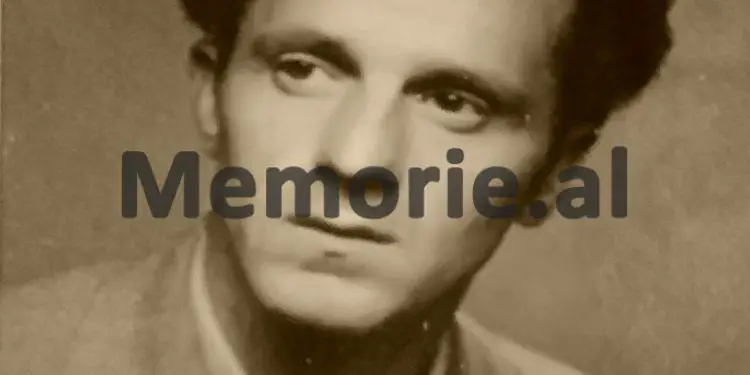


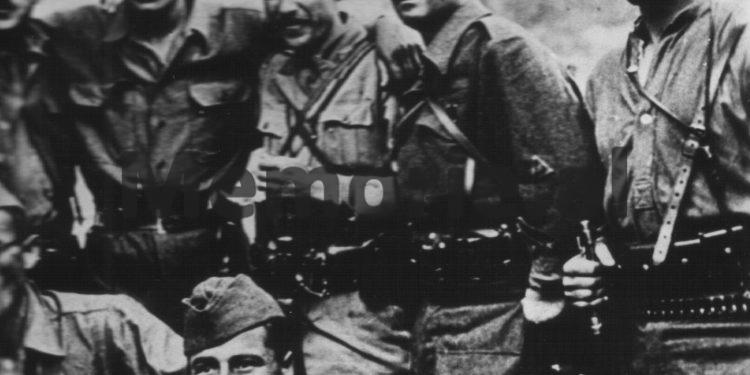
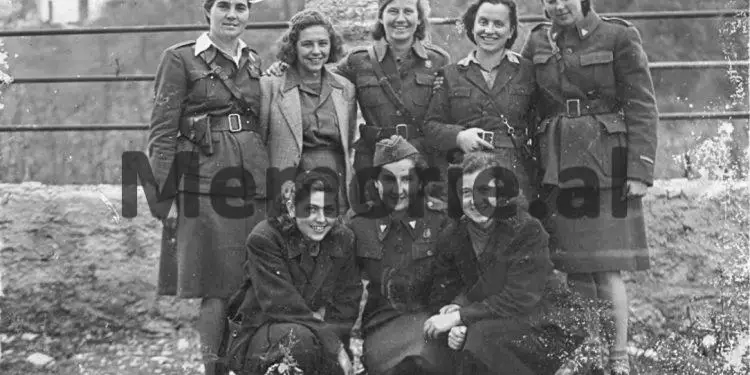
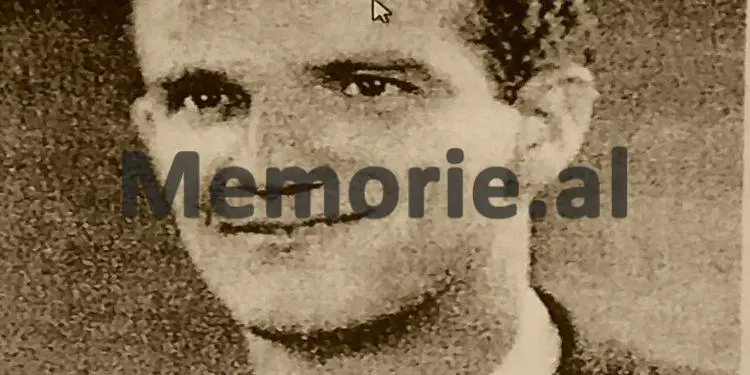
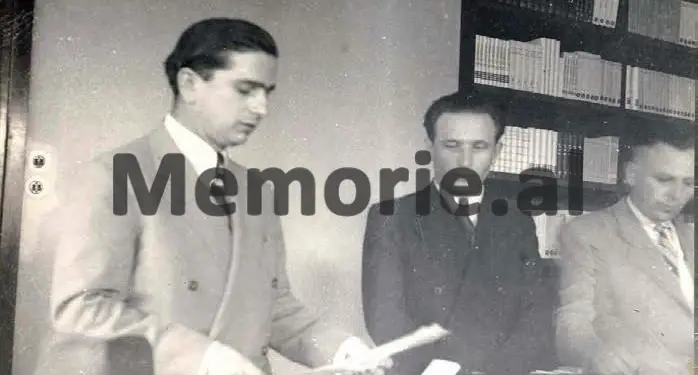




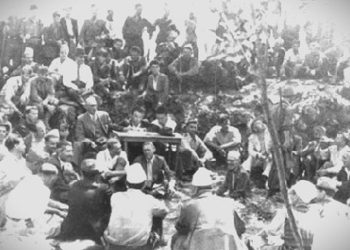
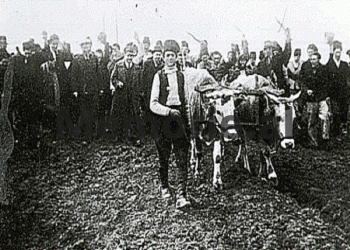
![“They have given her [the permission], but if possible, they should revoke it, as I believe it shouldn’t have been granted. I don’t know what she’s up to now…” / Enver Hoxha’s letter uncovered regarding a martyr’s mother seeking to visit Turkey.](https://memorie.al/wp-content/uploads/2026/01/Dok-1-350x250.jpg)
